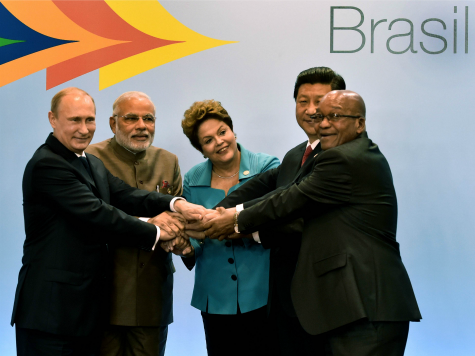
The countries forming the BRICS alliance – Brazil, Russia, India, China, and South Africa – have agreed to develop a Shanghai-based banking institution to rival the International Monetary Fund. The organization would lend money to friendly nations and aspires to take power away from the Western nations governing the IMF.
According to Agence France-Presse, the leaders of all five countries, meeting in Fortaleza, Brazil, agreed to establish the organization in Shanghai and invest an initial capital of $50 billion, which could later rise to $100 billion. Every nation has invested an equal amount so as to prevent any individual nation from gaining undue influence in how the money is distributed. While the organization will be in Shanghai, the first chair of the bank’s board will be Brazilian, while the first president will hail from India.
The AFP adds that the bank will fund “infrastructure and sustainable development projects.”
Russian President Vladimir Putin declared the new bank “a very powerful way to prevent new economic difficulties.” Chinese President Xi Jinping agreed, adding, “We need to work to improve economic governance at a global level, increase the representations and voice of developing countries.” China’s government appears particularly optimistic about the endeavor, as it allows for China to lend money internationally from an office within its borders. Commentary in major Chinese newspaper Xinhua expresses a positive outlook toward China controlling international debts: “The two mechanisms will also serve as useful subsidies to the World Bank and the the International Monetary Fund (IMF), so as to strengthen the international financial system, making it a more balanced and just one.”
Indeed, balancing out the global influence of the IMF and World Bank, which is funded by Western countries, appears to be a major goal of the coalition. Brazil, in particular, could benefit from this; as a Latin American country, it has experienced the sort of financial crisis that comes from IMF debt problems and struggled out of such a crisis in the late 1990s. While it did not find its economy as damaged as other Latin American countries – like Peru, which outright refused to pay the IMF in the 1980s – it too struggled with debts taken out to eke out a position as a developing nation.
“The Brics is more than just about economic relations – it’s also a way to diversify and hedge against western influence,” said the Brookings Institution’s Harold Trinkunas to the BBC on the new BRICS bank. Brazil, in particular, he noted, “sees itself as part of the countries that are rising and critical of the present international system which is structured in a way that doesn’t reflect the actual distribution of power and influence in the world.”
The extent of the influence of the new bank remains to be seen, as will the state clients that will attempt to borrow money from it. It serves to increase not only competition among developing nations and the established West, however, but to send a message – particularly from Russia and China – that they believe their nations strong enough to establish not only a military rivalry, but an economic one with the United States and its allies.

COMMENTS
Please let us know if you're having issues with commenting.